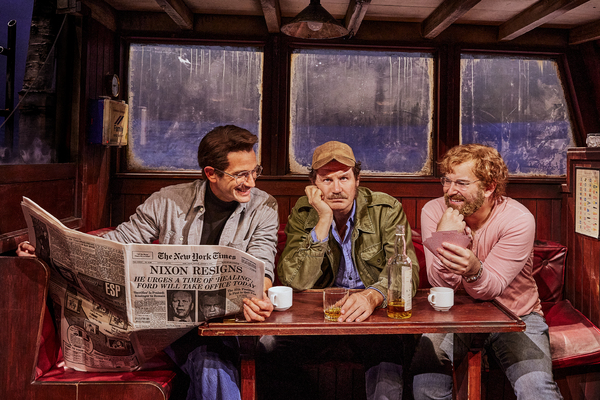7/31/23: The Shark is Broken
What: The Broadway transfer of the Edinburgh Fringe/West End play about the making of Jaws, starring and cowritten by Ian Shaw (playing his father, Robert Shaw), along with Alex Brightman as Richard Dreyfuss and Colin Donnell as Roy Scheider. Over the course of the film shoot, the three actors use their downtime while waiting on a broken mechanical shark to bicker, to play games, and to share stories.
And? I feel a bit terrible for saying this, because Ian Shaw is clearly doing this in tribute to his father, who died only three years after Jaws came out, but this is such a mediocre paint-by-numbers play. Every few minutes we get another wink-wink line that the audience, who knows the future, gets to chuckle sensibly at ("No one will be talking about this movie in fifty years!" is one such hackneyed example). I'm amazed the actors don't turn to the audience and hold for laughter each time they say one. The content of each character's various revelations is about as in-depth as a Wikipedia article, the conflicts are half-baked, and there isn't actually much enlightenment thrown on the troubled set (the shark may be broken--a great title, for what it's worth--but we're not gonna deal with that much). I desperately craved some kind of transformative moment, or even a moment of joy baked into all the woes and carps of the business. Instead, we're stuck on the same static claustrophobic boat these three men are (scenic design Duncan Henderson), going nowhere slowly. Literalism in theater isn't always terrible, but it's also rarely necessary. Theater is where we can do metaphors, y'all. Theater is where Jessica Chastain's Nora can stand up from the chair she hasn't left for the past two hours, open the back door of the theater, and step out into Times Square. The final beat of The Shark is Broken is a great one, and well-earned, but it deserved a bit more underlining from the design. This was our moment to break the play, and we missed it.
Additionally, we need to talk about the challenge of having period characters (or in this case, representations of actual real-life people) spouting cruelties. I'm going to pre-empt the defense of "people are complicated, people say and do bad things, this is just realism." Sure they are, sure they do, and sure it is. But there is a difference between someone saying something cruel under the play's and audience's recognition that this isn't okay (think: anytime a white character in a piece of fiction uses the N word), and that same cruel utterance being met with chortling laughs. That's punching down, and that's the audience laughing at the punching down. That's the audience agreeing that it's okay to bodyshame people, because fat bodies don't deserve as much compassion as thin bodies with alcohol dependencies. That's the play saying this behavior is okay, and the audience's complicity in that same cruelty.
Listen, I don't like Richard Dreyfuss either. But most of the digs at him in this play (which, like Robert Shaw, very much does not like Richard Dreyfuss) center around his being fat and his being Jewish, either overtly or covertly. There are ways to frame personality conflicts that do not center two things over which someone has no control. But here it seems to be "we don't like Richard Dreyfuss because he's a fat Jew, and therefore it's okay to laugh at him over it." Even his character's accusation that Shaw's play The Man in the Glass Booth is antisemitic (I haven't read it but, going by the plot description and premise, it sounds like it is problematic at best) is met with derision, like he's another Jewish person looking to be offended. When Shaw bemoans that actors like him and Scheider are being replaced by neurotics, all I can hear are dog whistles.
There are ways to frame these conflicts. And then there's this. Where the audience laughs every time Shaw is abusive to Dreyfuss.
And that's not how I want to spend my energy.
Hell, the mediocre writing didn't even make me want to go rewatch Jaws, and it should have achieved that at the very least. Aaron Sorkin could have fixed this, when he was a good writer. But unless they call in a script doctor, stat, we're stuck with this. Did no one call it out during the West End run? Are there not enough Jewish people there to say "hey maybe not with the latent antisemitism threading through this whole thing?" I don't think I'm another Jewish person looking to be offended. I think I'm a Jewish person who is tired of having to explain why things are offensive in the first place.
Um. All three actors were good. But this is a bad play.
 |
| Colin Donnell, Ian Shaw, and Alex Brightman as Roy Scheider, Robert Shaw, and Richard Dreyfuss. Photo by Matthew Murphy. |
No comments:
Post a Comment